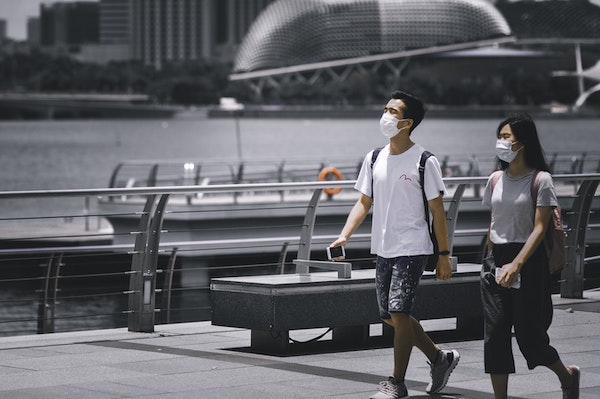Whether it is a road trip inside your own province or international travel, taking the proper safety measures is more than necessary even now. The restrictions and rules are constantly changing, travelers need to be well aware of what is currently going on when planning a vacay or weekend trip for two. Definitely, carry and always wear an ASTM Level 1 Medical Mask on you at all times when you travel, you do not want to get into trouble or pay hefty fines or worse.
Travel Domestic, Rather Than International
Your trip is a big event. You want to make sure that it’s perfect, and you need to consider all the possibilities of things going wrong during your trip. It may be difficult if something goes wrong in another country or you may be faced or if you are faced with health insurance problems about being accepted abroad. If borders close on us while we’re away from our home, returning by air could get expensive too!
The worst-case scenarios – when everything seems like it’s against us – can happen any time but they are especially likely (and frightening) when traveling overseas. There have been many cases where people had an emergency medical condition at their destination which made them unable to return back home without facing difficulties because there were no longer flights available.
If you own a private car or a van, that could be the best option to make a road trip this summer.
Get Insurance
Traveling can be uncertain, as 2020 dramatically proved. The travel industry took a hard hit but, despite that, they offered travelers more lenient cancelation penalties than they had pre-COVID. Travelers shouldn’t depend on forgiving cancellation policies in 2021, though. Instead, they’ll need to protect themselves with travel insurance.
If your plans are canceled because you get sick or are ordered to quarantine, a travel canceling insurance policy can help you get back part of what you paid to secure your travel plans. You will not receive full reimbursement, but you’ll get enough back that you can save it and put it toward another trip.
Travel medical insurance is vitally important to protect your health while traveling abroad. Many countries won’t treat your illness or injuries if you don’t prepay. Without a travel medical policy, not many people have the funds to be able to do that. Even if you have good health insurance in Canada, it likely won’t provide coverage overseas, so you will need standalone coverage for your trip.
Be Prepared & Be Flexible
Here are some of the best practices we have gathered from experience and guidelines: Take private tours, walking experiences, and arrange entry to attractions at off-peak times. In public areas and when in contact with other people, wear a mask. Wash your hands with soap and water after every contact with other people.
Plan trips to destinations that offer outdoor activities and are not crowded. Travelers should be informed about local regulations and curfews. Avoid dance clubs and venues that are crowded. If you wish to dance, have your local agent arrange a private dance parlor for you and your group.
Never self-medicate or keep symptoms hidden. Any illness is best treated if detected on time. Carry your prescriptions and a backup dose of your medicines, in case of an emergency abroad. Proper access to a doctor for a prescription or a specific medicine may not be available.
Respect Your Destination
Before you even consider going on a vacation, look at the infrastructure of the destination. Can they handle tourism, and do they have the infrastructure in place to deal with an influx of positive COVID-19 cases if it happens? If not, look for somewhere that does. Many tourist destinations were hit hard at the beginning of the pandemic due to travelers coming in and bringing COVID-19 cases to areas that didn’t have enough essential workers, hospital beds, etc. to deal with the influx.
It’s irresponsible to travel to places that aren’t able to handle high numbers of cases. Countries around the world now have forms that you must complete before leaving and/or entering the country. Check what exactly needs to be completed, by when, and if it needs to be done on paper or online. Many countries require you to have proof of a negative COVID-19 test completed within a certain amount of time before your flight.
Get tested before you leave and have your negative results printed out or easily accessible on a device in case restrictions or regulations change while you’re traveling. Many countries have restrictions that are changing almost daily, and you don’t want to be stuck in a foreign country lacking the documentation that you needtook the proper steps to ensure your and the indigenous community’s safety.
COVID-19 has affected our daily lives and nothing will change while you’re away on a trip. We now need to follow all hygiene protocols and standards to keep ourselves safe. Follow all PPE-wearing protocols while on the plane, as well as social distancing measures that have been put in place.
While aboard, follow and practice all the local PPE and social distancing guidelines. Make yourself a Medical PPE checklist before you travel anywhere, just as you would for any other items you may need and pack for any trip.
It is very important to contain the spread of the virus, and traveling with the virus is irresponsible. If you have or suspect you could have the virus, self-isolate for 14 days. If you suspect you have the virus on a trip or test positive for the virus at the airport, you must self-isolate in your accommodation for 14 days, and let the airline and accommodation know.
Any kind of travel increases the risk of transmission to you and your community at some level. If you do choose to travel, wearing a mask properly is key anywhere. Making sure to self-isolate for two weeks afterward will ensure that you do not pass along anything you may have picked up on your adventure. Last but definitely not least, enjoy yourself and be safe.










![Daily Bite [Make]: Philly Cheesesteak Stuffed Bell Peppers](https://dashofwellness.com/wp-content/uploads/2013/01/Philly-Cheesesteak-Stuffed-Pepper-Daily-Bite-1-100x70.png)
